- NJASA
- Community Corner March 2024
-
Navigating the Rapids: A Multi-Faceted Approach to Post-Pandemic Recovery in Delsea Regional and Elk Township School Districts
The tumultuous waves of the COVID-19 pandemic left educational systems worldwide grappling with the wreckage of unfinished learning, strained mental health, and a fractured sense of community. In the face of these challenges, Delsea Regional and Elk Township School Districts embarked on a journey of post-pandemic recovery, our story offering valuable lessons for educators and administrators navigating the uncharted waters of a transformed educational landscape.
Charting a Course: Prioritizing Evidence-Based Interventions
Armed with ARP-ESSER, Bipartisan Safer Communities Stronger Connections, ESEA, and SRSA-REAP grant funding, the districts refused to be swept away by the current. Instead, they charted a course guided by a fundamental principle: prioritizing evidence-based interventions to address the multifaceted needs of their students. Recognizing the critical role of high-quality instructional materials, they leveraged the What Works Clearinghouse, Evidence for ESSA, and EdReports to meticulously select resources aligned with rigorous academic standards. This data-driven approach ensured students encountered materials proven to accelerate learning and bridge the gaps left by pandemic disruptions.
Embracing Flexibility: Multi-Tiered Interventions for Diverse Learners
Understanding that the recovery journey wouldn't be a smooth sail, the districts implemented multi-tiered interventions throughout the school day. Recognizing the diverse needs of their learners, they embedded flexible support structures. The elementary school added dedicated periods for pull-out intervention, gifted and talented programming, and small group instruction, catering to individual learning styles and paces. The middle school adopted a data-informed approach, creating instructional teams and tailoring intervention placement with clear entry and exit criteria, and a WIN period, ensuring no student was left behind. The high school, leveraging its unit lunch program (Delsea One), transformed the time into a haven for targeted student-teacher interactions, providing additional support where needed. This adaptability ensured interventions weren't a one-size-fits-all solution, but rather a lifeline tailored to each student's unique needs.
Rekindling the Spark: Reinvigorating Electives and Fostering Engagement
Beyond academics, the districts recognized the pandemic's toll on student engagement and sense of belonging. To rekindle the spark of joy and exploration, they embarked on a mission to reinvigorate elective offerings. From origami and theater in elementary schools to law enforcement and career and technical programs in high school, the districts expanded their course catalogs, offering a kaleidoscope of opportunities that extended beyond core academics. These electives served as more than just curriculum additions; they became bridges, reconnecting students with their passions, fostering a sense of community, and reigniting the flames of curiosity and motivation. In our middle and high school math classes, we have embraced the work of Peter Liljedahl and Building Thinking Classrooms. Students are up and engaged with mathematical thinking at grade level expectation. It is magical to see.
Images from the Building Thinking Classroom Lessons Below
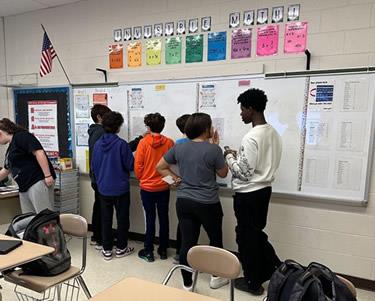
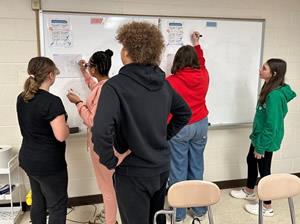
Building and Construction Class build small-scale model homes:
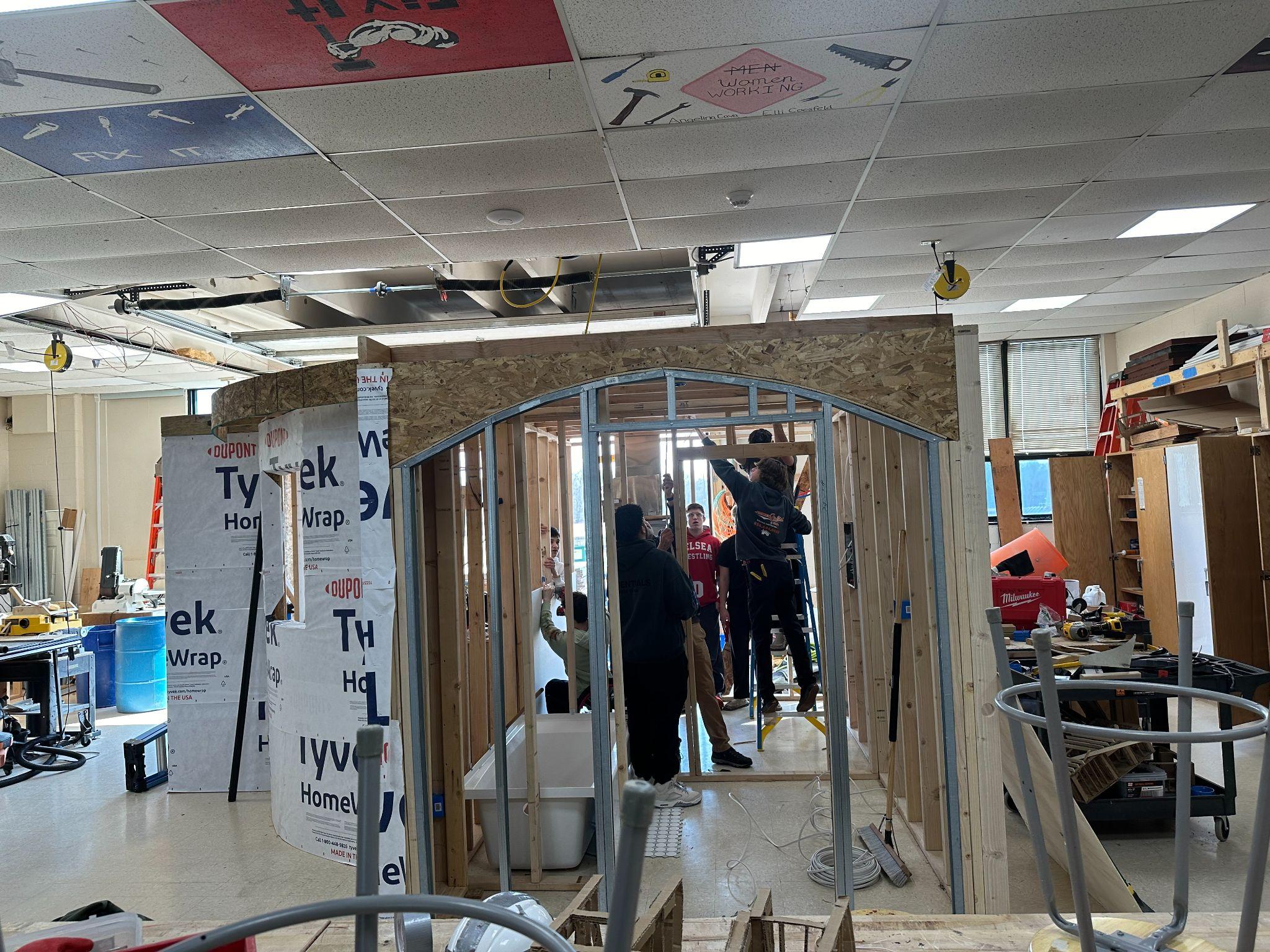
Building a Safety Net: Expanding Mental Health Services
The pandemic's invisible scars ran deep, impacting students' mental and emotional well-being. Recognizing this critical need, the districts partnered with Jefferson Health to expand their mental health safety net. Jefferson Health is a major healthcare system in Southern New Jersey and Philadelphia. Jefferson licensed social workers were brought on board, offering a safe space for students to navigate their anxieties and challenges. Additionally, a dedicated community wellness manager became a champion for students and families, connecting them with vital resources like routine healthcare, food assistance, and multilingual support. This partnership served as a lighthouse, guiding students and families towards the shores of stability and well-being.
Investing in Educators: Research-Based Professional Development
The districts understood that recovery would be impossible without empowered and equipped educators. They prioritized research-based professional development (PD) opportunities, partnering with Corwin to provide educators with the tools and strategies proven to accelerate learning. This deliberate and sustained approach transcended the traditional PD model, focusing on high-impact instructional strategies supported by the research of John Hattie. This investment in educators wasn't just a drop in the bucket; it was a sustained current, propelling them forward with the confidence and knowledge to meet the individual needs of their students. Our administrative walkthroughs are centered around these practices and provide the districts with aggregate information to use in planning future sessions.
Forging Partnerships: Charting a Collaborative Course
The districts refused to navigate the uncharted waters of recovery alone. They actively sought partnerships with organizations like Milwaukee Tools, Rowan College of South Jersey, and local tree nurseries. These partnerships weren't merely agreements on paper; they were bridges built on shared goals. Milwaukee Tools provided surplus tools for CTE programs, equipping students with the practical skills needed for future careers. Rowan College opened doors to dual enrollment and dual credit opportunities, offering a glimpse into higher education. Even local tree nurseries partnered with first-grade students, fostering a connection with nature and hands-on learning experiences. These collaborations extended the reach of the districts, providing students with invaluable resources and opportunities that went beyond the four walls of a classroom.
Charting New Waters: A Voyage of Academic Triumph and Transformation
As we navigate the waters of educational excellence, the elementary schools within the Delsea Regional and Elk Township School Districts have embarked on a remarkable voyage, achieving significant strides in ELA and math. This journey has been marked by not just grade-level advancements but also notable cohort growth, illustrating a steadfast commitment to nurturing the seeds of knowledge and understanding in every student. Further upstream, the middle school has successfully steered clear of the "school in need of comprehensive support" designation, a testament to its academic resurgence and the effective curtailment of chronic absenteeism. This transformation reflects a collective effort to anchor in the safe harbors of educational success. The 2023-2024 mid-year data presents a beacon of progress, with both districts not only meeting but exceeding the set benchmarks and indicators of growth and performance. This achievement heralds a new era of academic excellence, where every student is equipped to sail toward their horizon of success, guided by the stars of hard work, dedication, and community support.
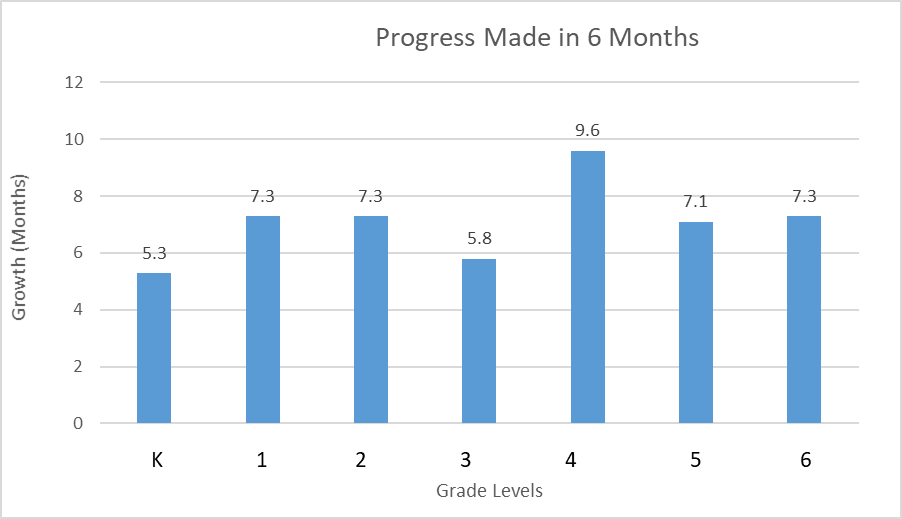
This chart highlights the amount of growth across grade levels since September. The left axis shows the amount of growth in months. For example, in grade one, students made 7.3 months of growth in 6 months.
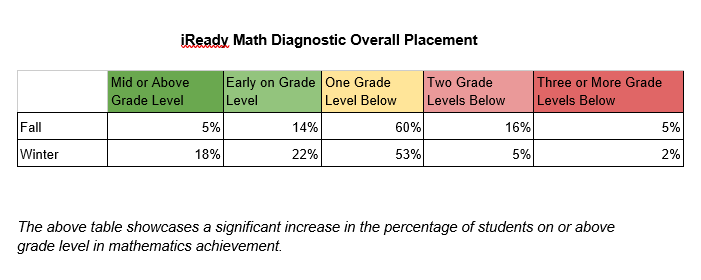
Delsea Middle School Math
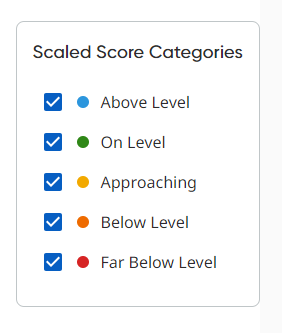
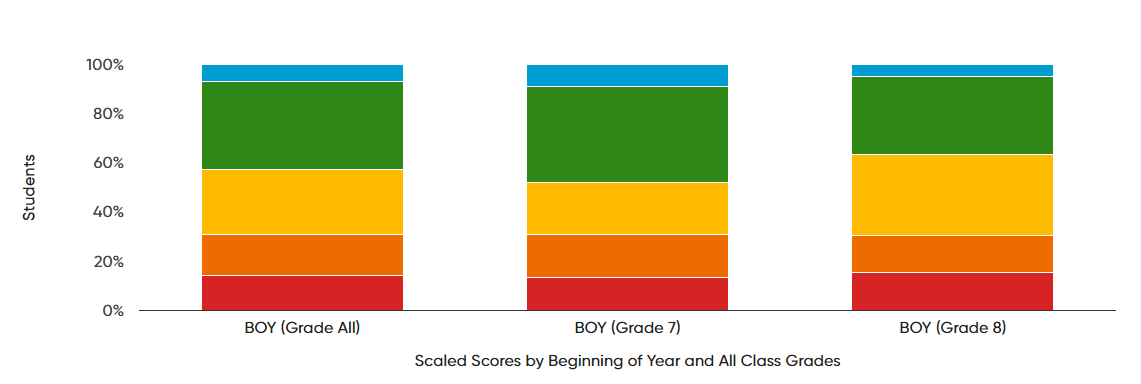
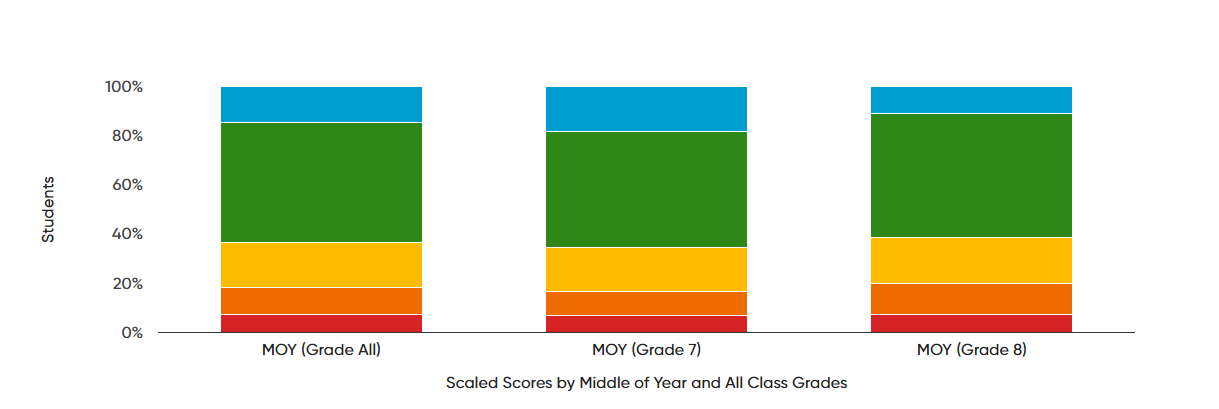
These above charts highlight the increase to the number of on level and above level scores and decrease to the number of approaching, below and far below grade level scores.
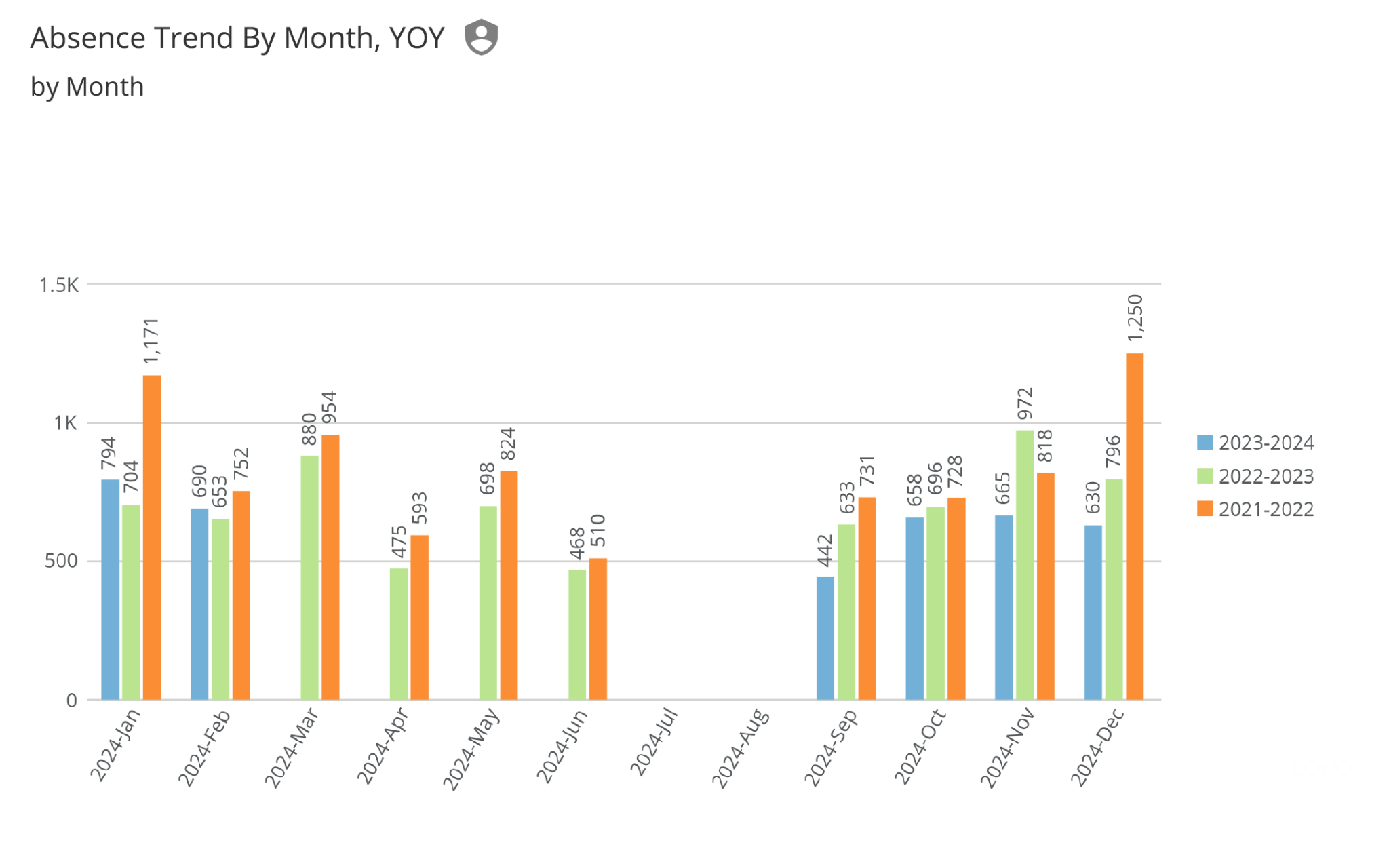
The above graph showcases the strides made in reducing student absenteeism over a three-year period.
Lessons Learned: Navigating the Unfolding Journey
The journey of Delsea Regional and Elk Township School Districts offers a beacon of hope in the midst of post-pandemic challenges. Our multi-faceted approach, guided by evidence-based interventions, a focus on mental health, community engagement, and educator development, serves as a testament to the transformative power of collaboration and unwavering commitment to student success. As educators and administrators worldwide continue to navigate the ongoing challenges of a transformed educational landscape, the lessons gleaned from Delsea Regional and Elk Township School Districts offer valuable insights:
- Prioritizing Evidence-Based Interventions: Moving beyond the reactive phase, data-driven decision-making and utilizing resources like the What Works Clearinghouse can ensure interventions have a demonstrably positive impact.
- Embracing Multi-Tiered Systems: Recognizing the diverse needs of learners requires flexible support systems. Tailoring interventions to individual needs through evidence-based practices ensures no student falls through the cracks.
- Reinvigorating Engagement: Beyond academics, fostering joy and exploration through diverse electives can rekindle student motivation and foster a sense of belonging.
- Expanding Mental Health Services: Investing in comprehensive mental health support through partnerships with external organizations can create a safety net for students and families navigating emotional challenges.
- Investing in Educators: Prioritizing research-based professional development empowers educators with effective strategies to meet the individual needs of their students and accelerate learning.
- Building Strategic Partnerships: Leveraging community resources and forging strategic partnerships can extend the reach of educational opportunities and provide invaluable experiences for students.
The journey of Delsea Regional and Elk Township School Districts is far from over, but our story serves as a compass for navigating the uncharted waters of post-pandemic recovery. By embracing evidence-based practices, prioritizing student well-being, and fostering collaboration, educators and administrators can chart a course towards a brighter future for all students.



